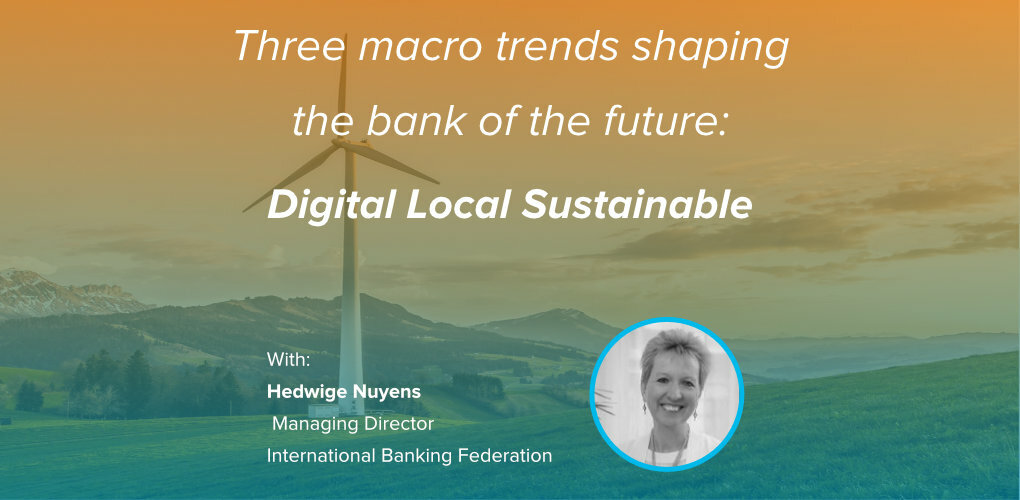
Insights & Opinions
Three macro trends shaping the bank of the future: Digital - Local - Sustainable
Tue, 09 Feb 2021


Three words to sum up the answer of Hedwige Nuyens, Managing Director of IBFed (International Banking Federation), on the question of what will shape the bank of the future: digital — local — sustainable.
I could have stopped my blog here, ready to set the record for the shortest to-the-point opinion piece ever, but I will not. Hedwige shared so many valuable insights, ideas and visions that influence how the banking industry will evolve the coming years. And let’s face it, she knows, as the Managing Director of the International Banking Federation, she represents 95% of all banks worldwide.
As our special guest for The Banking Scene Afterwork on February 4, we spoke with her about COVID-19, digital, branches, BigTech, CBDC, crypto, the role of savings and community banks and much more.
As I said: high-level, 3 trends will shape the future of banking.
Digital
For decades banks have digitalized, both in the front, in the back and the middle. As they made all the investments, they stimulated, sometimes even annoyed, their customers to adapt to these digital tools, and with success. In fact, COVID-19 didn’t change this.
What it did change, was that now customers start demanding sophisticated digital processes, services and products, not just consumers, maybe even more SMEs. The balance of demand is shifting from a push to a pull mechanism.
During the crisis, branches were closed, digital commerce and remote advice were the only means to consumer products and services. So people adapted and they found out that it was a lot more convenient.
The most agile banks had solutions to overcome the overload of call centre requests and applications for recovery programs; they had toolings available to automate their customer’s government support applications.
Customers no longer accept that financial services, any service, is only available during office hours. Banks that want to graft this in their physical presence will need to keep in mind that they still provide an omnipresence, where branches are only part of the solution, next to video, chat, apps, internet banking.
All of this will influence a bank’s branch strategy. Hedwige expects a lot fewer branches in the future, especially in a dense market like Belgium: “Belgium has double the size of bank branches than in the Netherlands, whereas we have, of course, a smaller population.”
Branches will remain, in her opinion, but maybe in another form, like a shared branch, or partnerships with retailers. Someone in the audience suggested an evolution to a more multifunctional sort of centres of excellence for a client’s financial business, beyond pure banking.
“The move to digital means that banks and clients want to have everything ready in a digital form,” said Hedwige. “This also means that BigTech has become even more important and has become even more systemic”.
Research of IBFed, in partnership with Oliver Wyman, acknowledges that BigTech is increasingly influencing financial services, by getting embedded in the distribution of financial services. Still, it is unlikely that they will ever become a bank themselves. The reason is simple: BigTech is valued at 30 times their yearly revenue, banks only 10 times. The only reason why BigTech is looking at financial services is for the data linked to delivering financial services. The example of Alibaba showed the impact for BigTech, once they encapsulate too deep in financial services.
Hedwige believes that this is not only a threat but also an opportunity for financial services providers: “We as bankers have to learn a lot about AI and about big data and what we can do with data. But what we can learn and what we can bring to BigTech is the need for transparency, accountability.
As a banker, you have to be able to explain why you refuse a credit, we all know that in Belgium. You have to explain why you have a bad credit score, and you just can’t say it’s a system, it’s a black-box. So big data, that’s nice, but you have to be able to be transparent and explain what is behind the algorithms and you have to be able to guarantee data privacy and ethical use of your data.”
Local
This trend may surprise some, but don’t underestimate how this can change our economy and financial services.
Hedwige: “As we are bankers, as we are in financial services, we thought of China as the world’s production hub. But as soon as you have a struggle or an impediment, everything gets blocked. So the move to local means that a lot of production chains are redesigned, reshuffled. We saw the same at a much lower level with Brexit, so move to local.”
Localisation, the trend to circular living and printing-of-everything and the many other consequences is part of the reason why SMEs hold a bright future. Hedwige: “The whole move to digital could be seen as a kind of the fourth revolution whereby you can do things, make things, provide services, but in a different way than before.”
Countries will no longer accept to be completely dependent on a giant manufacturer in the East in critical industries. They want control over certain supply chains. Of course, this does not mean that all SMEs will be rescued from today’s crisis; we can expect a massive reshuffle.
New, digitally native SMEs will rise, and banks will need to prepare for the new generation that no longer accepts to sign paper documents. SME banking will never be the same again. Nor will retail banking by the way.
Will retail banks evolve to a one-size-fits-all? Like we have heard in the session on the new face of digital banks, Hedwige believes in the richness of small niche players. Will savings and community banks be redundant in the future? No, but there will be fewer, and they will need to put a lot more emphasis on their purpose. At the back, they collaborate with peers to create economies of scale, and on the front, they provide tailored service, specific to their clientele that is willing to pay for it.
Another surprising element here: digital currencies. When asked who will win the digital currency way, the first remark of Hedwige was that the public authorities are gatekeepers. Today’s pole position for digital currencies is China, but Europe, or the USA, will not give in on this. They have too much to lose.
Hedwige: “The US wants to be there as well. They are reserve currency of the world, and they want to stay as such. So whenever they have a digital dollar, it will be even easier to continue to invest them.” She is not abandoning on Diem either. She believes that they make an excellent chance to be successful if they accept supervision. In other words: if they accept local authorities to have a say in it.
So yes: after the hype of crypto, digital currencies will rise, as a tool to influence local economies, like currencies always did, which is why it deserves special attention in “Local” according to me.
Sustainable
Sustainability is not new, but the crisis and the recent pressure on political bodies to act on global warming put it a lot higher on the agenda. Hedwige sees the Green Deal, the green recovery plan as an incredible opportunity for the financial sector.
We will go deeper in the Green deal and the bank’s efforts in ESG in other sessions later this year.
There was one essential part of the discussion linked to sustainability that I don’t what to withhold. That is the idea of how a Central Bank Digital Currency (CBDC) can impact sustainability. Hedwige explained that the idea is that it allows Central Banks to distribute money, accessible to everyone, it can be processed immediately and it is fully transparent.
The latest technologies not only allow for track-and-trace but also to tag money for specific purposes. In the context of anti-money laundering, but also sustainability, this can be very powerful and it can give a new purpose to banks.
Hedwige: “The central bank will launder money, but who is going afterwards to open the accounts to distribute, do the checks in terms of declines, accessibility, etc.” This is where banks can still play an important role if they adapt properly to this new reality.
Conclusion
Perhaps the strongest message of Hedwige during this session was, my main conclusion is:
“COVID-19 is a gigantic world-scale stress testing exercise. I see also a lot of good things coming out of it. We all learned a lot. We had to adapt quickly. It strengthened our resilience. What doesn’t kill you can make you better. We, as entrepreneurs, as business people, should try to see what kinds of opportunities arise and how we can move forward.”
Does this message sound familiar?
Would you like to attend one of our Afterwork sessions as well? Have a look at our program: The Banking Scene - Afterwork


